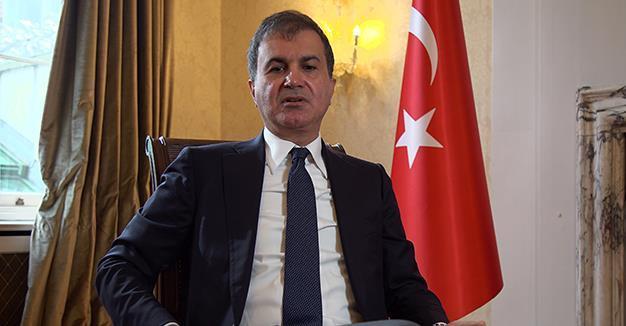Turkey feels ‘betrayed’ over EU accession but still wants to join the club
LONDON – Reuters

REUTERS photo
Turkey feels betrayed by some European Union leaders who have called for the end of accession talks but still hopes eventually to join the bloc, Turkish EU Minister Ömer Çelik has said.
The European Union has become increasingly critical of Turkey’s membership drive. Turkish President Recep Tayyip Erdoğan accused Berlin of “Nazi-like” tactics in March when it prevented Turkish ministers speaking at expatriate rallies in Germany. Chancellor Angela Merkel said in an election debate 10 days ago it was clear Turkey should not join the EU and entry talks should end, despite it being a crucial NATO ally.
Çelik chided European Union leaders over statements on Turkish accession and said some, such as Merkel, were using the criticism to deflect attention away from the EU’s internal problems such as Brexit, migration and reform.
“They put all those aside and they stoke antagonism towards Turkey in order to cover up their vital internal problems,” Celik told Reuters in an interview on Sept. 14.
“We are indeed disappointed by Merkel and some others in the EU: at one of the hardest times in our history we were left alone by our friends and allies,” he said through a translator.
When asked if Turkey felt betrayed, he said: “Yes.”
Çelik said that EU leaders such as Merkel had failed to keep their promises to Turkey on its EU bid which began in 1987 with an application to join what was then the European Economic Community. Turkey’s accession negotiations began in 2005.
“The EU has failed to keep all of its promises whereas Turkey has delivered on all of the promises it made,” Çelik said.
Jean-Claude Juncker, president of the European Commission, said on Sept. 13 he saw no prospect of Turkey joining the EU in “the foreseeable future.”
“What has Mr Junker done, what giant strides has he made, to find solutions to bring the EU and Turkey closer? That is my question for Mr Juncker,” Çelik said.
“If Germany keeps giving orders to the EU institutions - such as cutting negotiations with Turkey - then it will strengthen the hand of racist groups in Europe,” he said.
Formally ending Turkey’s accession negotiations would require unanimity among EU states, which is lacking, though majority backing is enough to suspend them.
Çelik suggested that a leaders summit of the EU and Turkey be called to improve relations.
“Turkey has not given up on its target to be a full member of the EU: We are eager and willing to find solutions to move forward,” he said.
EU leaders will discuss Turkey at a summit in Brussels in October, though any formal decision on its future may not come before next spring.
Çelik dismissed concerns that Turkey’s purchase of an S-400 air missile defense system from Russia indicated the NATO member could be turning away from the West.
“It is obvious on which side Turkey really is,” he said. “Turkey has made immense contributions to security and prosperity in Europe.”
“When it comes to Turkey being an integral part of NATO and Turkey having friendly relations with Russia, it is not an ‘either or’: They don’t exclude each other and are complementary to each other.”
